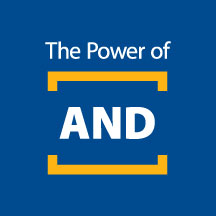One of the most under-appreciated words in the English language is the word ‘and,’ that tiny little con-junction or 3-letter joining word. Coke Zero ran an intriguing ad that is rich and instructive about how to use ‘and’ constructively for effective communication:
In the same vein, The University of Wisconsin-Eau Claire recently ran a whole promotional campaign called, eloquently, the power of and….The idea or the power behind this little 3-letter word in both the Wisconsin and Coke ad crusades is to remind us that choices are greater if we think of ‘and’ versus either/or in whatever decision-making process we encounter. With regard to evoking health behaviour change/s, we have talked about the importance of shifting perspectives as a key tactic or skill for working with clients in shifting their behaviour. But there is another aspect to using the word ‘and‘ that is equally effective in arranging an MI conversation. Reflective listening is the ‘R’ in Miller and Rollnick’s OARS acronym and it is a very important or “core” MI strategy. The idea in reflective listening is to mirror back verbally to clients, mostly using their own words, what it is we heard. There are simple (almost exact client wording) and complex (client wording with a prompt to spur or engender client insight) reflections we can use; it depends on client readiness and our evolving skill in reflective listening. What we would encourage here is the use of ‘yes, and‘ as a potent way to enhance the MI process when reflecting back to clients. The idea is to acknowledge or see your client by using the word yes either literally or figuratively, and then add an insight or thought about what you heard in a manner that might serve your client. For example, if a client expresses his anger about knowing all about regulating his diet to reduce overweightness but he just can’t seem to do it, you might reflect: you are pretty discouraged about this and it seems like you haven’t given it your best effort yet. The first part of the reflection is the ‘yes’ component and the second part, the ‘and‘ aspect isn’t judgmental; instead it’s a gentle, empathetic prompt back to your client that might stir him, ideally, to try giving it his best effort. Thus, similar to the Coke and Wisconsin power of and ads, using ‘yes, and‘ in MI reflective listening can be transformative with and for your clients.

